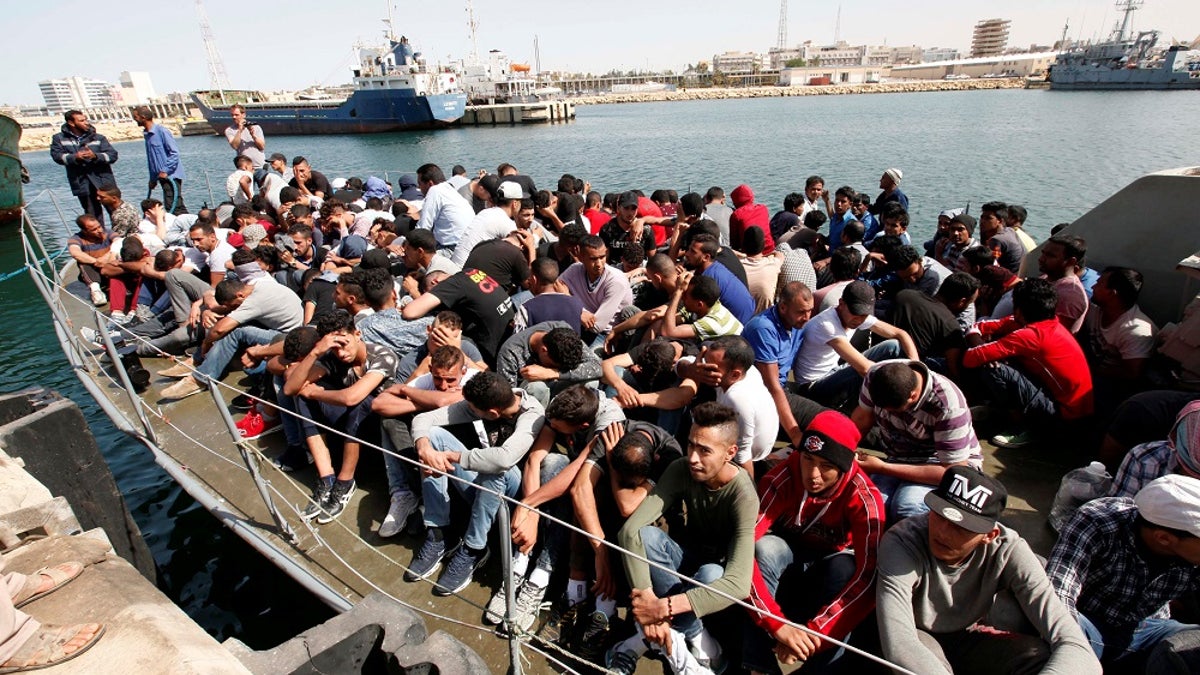
Illegal migrants arrive by boat at a naval base after they were rescued by Libyan coastguard in the coastal city of Tripoli, Libya, May 10, 2017. (REUTERS/Ismail Zitouny)
If proof is needed that Barack Obama’s “lead from behind” foreign policy was a dismal failure, look no further than Libya. And if President Trump wants a win against terror, he should look to the same place.
Since longtime dictator Muammar Qaddafi was overthrown and killed by a howling mob in 2011, Libya – the oil-rich gateway to northern Africa – has had no government. Or rather, it has three competing governments, each claiming to be the country’s rightful ruler. Oh, and did we mention 1,600 – count them – armed militias? Not a recipe for stability.
To make matters worse, the country’s infrastructure has crumbled. Electricity is available only for a few hours a day, even in the capital, Tripoli. Oil production, which made Libya one of the most prosperous nations in the region, is at between a third and a half of capacity. Civilians are kidnapped – or worse – by marauding gangs. Banks refuse to let customers withdraw more than $20 at a time. And more than $40 billion in international aid has simply gone missing.
How did things reach such a point of chaos? Many Libyans point to Obama’s tepid response after Qaddafi’s overthrow. His idea was to provide logistical support and back the militia groups that he thought could be persuaded to create democracy.
Instead, the various militias, including some allied with Al Qaeda and ISIS, fought among themselves like Bloods and Crips, resulting in at least 55,000 deaths, many of them civilians.
The country, whose population is overwhelmingly Sunni Muslim, nonetheless is divided by geography. In the east, tribal leaders are still nursing a longtime grudge against the poor treatment they received from Qaddafi during his 42 years in power. The east is ruled by Kalifa Haftar, a former officer in Qaddafi’s military who promoted himself to general of the so-called Libyan National Army, which is effectively a big militia. Haftar, who lived for 20 years in exile in Virginia, has spurned U.S. support in favor of closer ties with Russia, though he remains open to contact with the Trump administration.
Libya also has an elected parliament, which fled Tripoli and took refuge in Tobruk, in the east. And a weak cabinet holds court in Tripoli, surrounded by armed jihadi militias.
In the west, and around Tripoli, various jihadi militias battle each other — and Haftar’s troops, when they venture out of the east.
When Italy’s prime minister visited the White House last month, he urged Trump to take an interest in Libya’s future. The president’s response: Libya is not a priority.
He might want to reconsider. Helping to stabilize Libya would be a foreign policy win for the U.S., and a signal to Russia that American leadership in world affairs is making a comeback. “Trump needs to clean up the mess made by the last administration,” says former Libyan prime minister Mahmoud Gebril, who survived four assassination attempts. “The militia leaders are ready to put down their weapons in exchange for amnesty. This civil war has gone on too long. It would be a peace of exhaustion.”
“Libya needs U.S. leadership,” Walid Phares, a Middle East scholar and author (and Fox News contributor) who advises Trump, told me. “Congress wants to destroy the jihadists. That can be done, but the president needs to step up.”
Libya is sure to come up when Trump visits Saudi Arabia this week. It is a chance for the president to do something substantive and positive. He can’t tweet it. He has to treat it like the opportunity it is.
